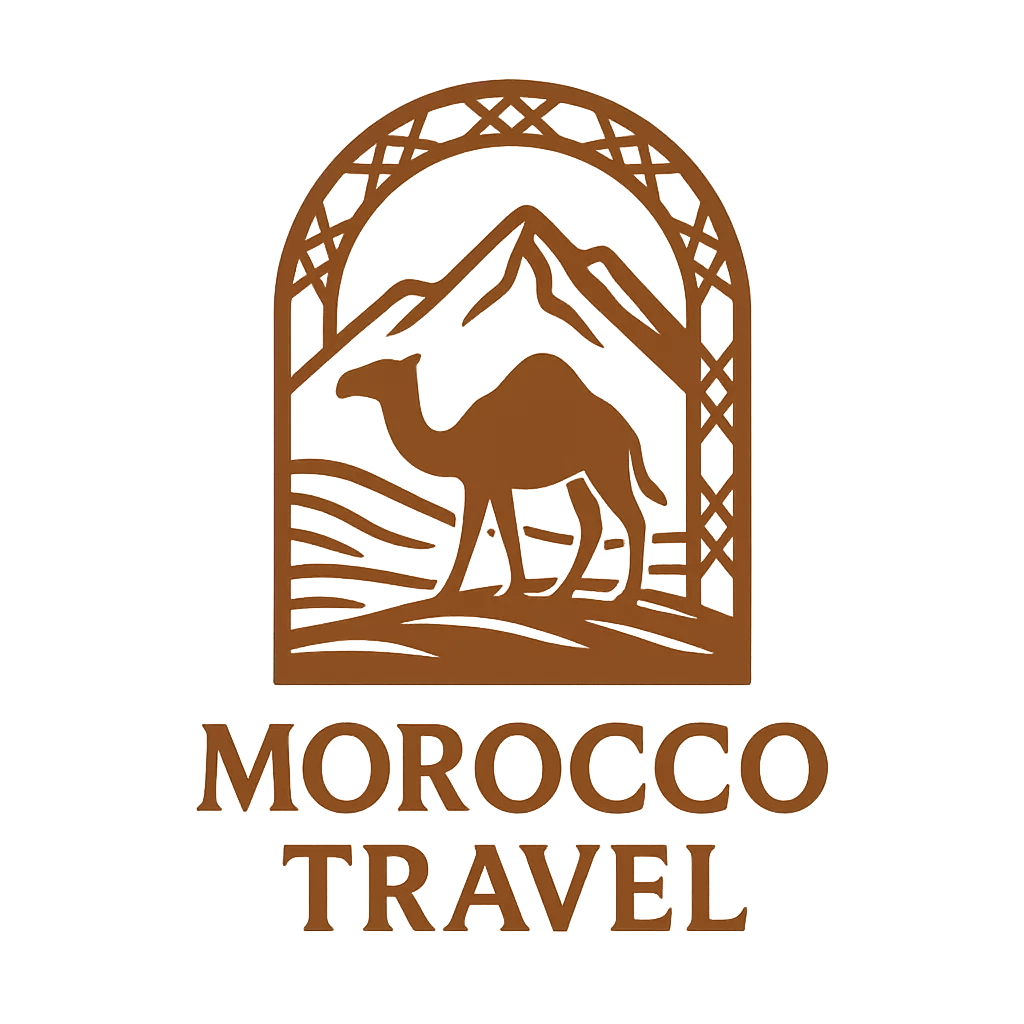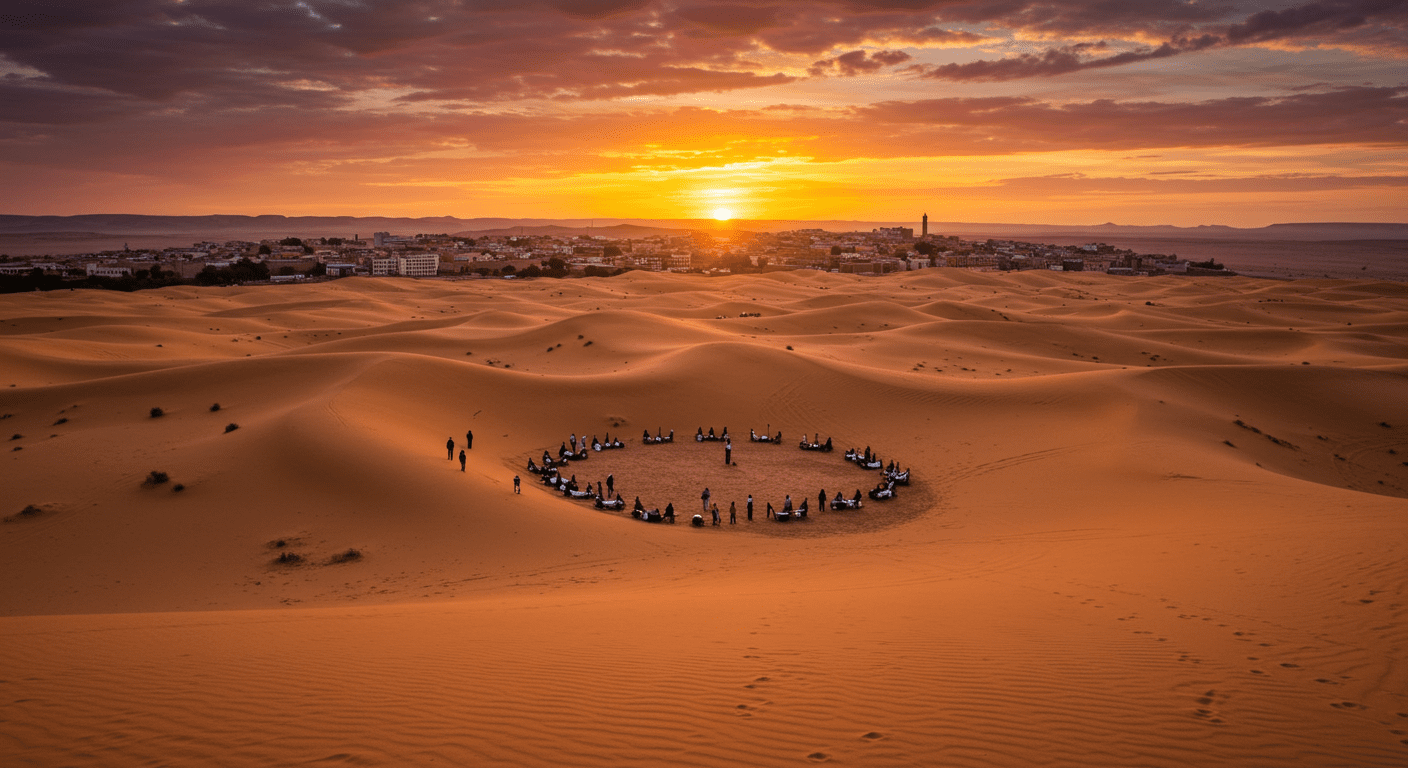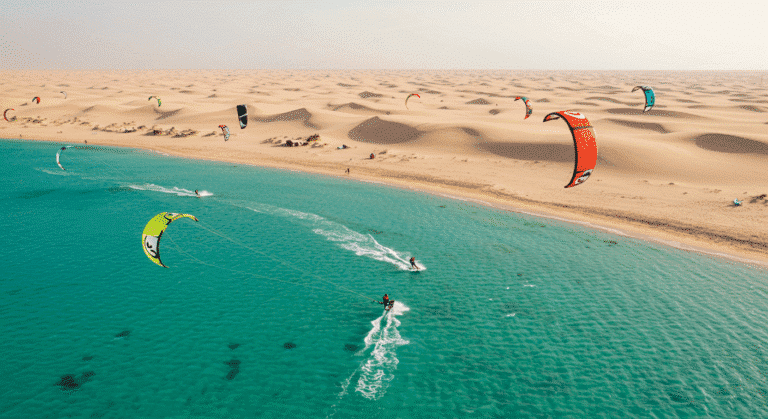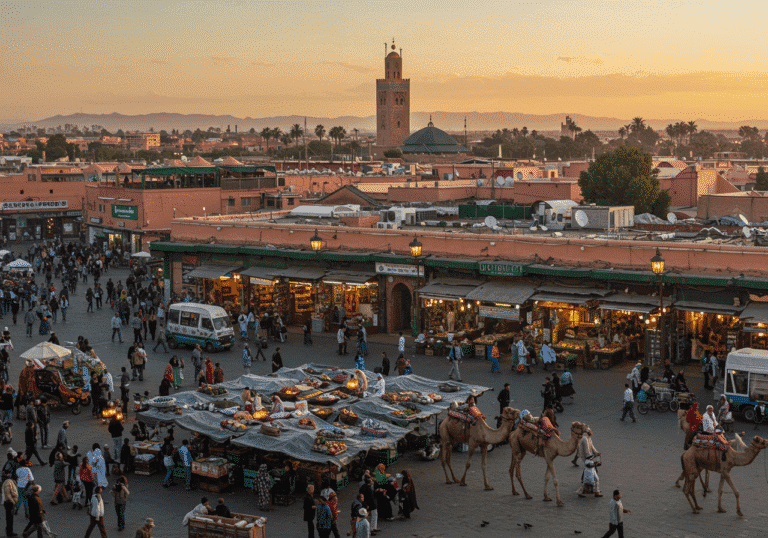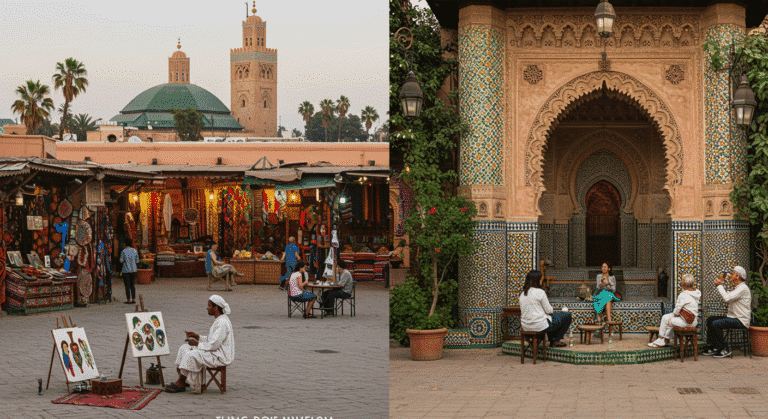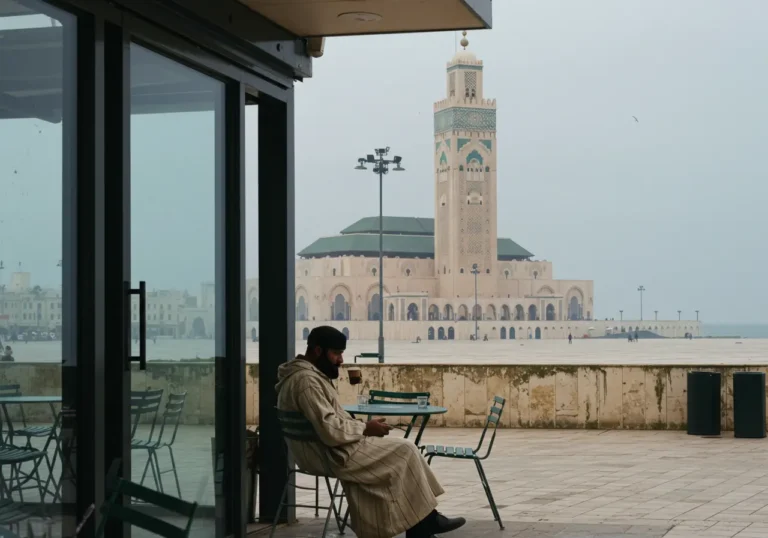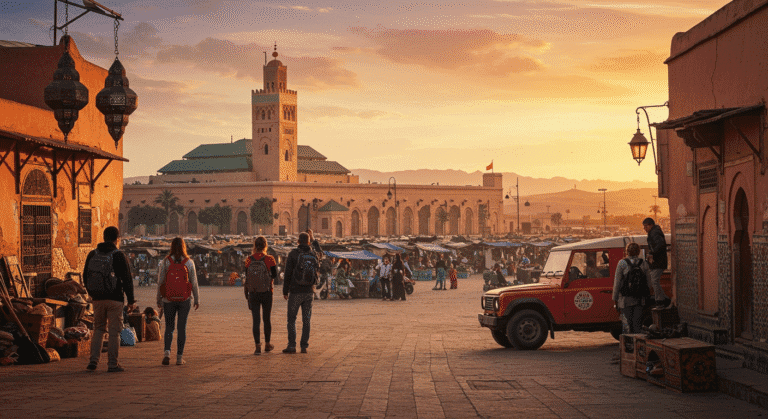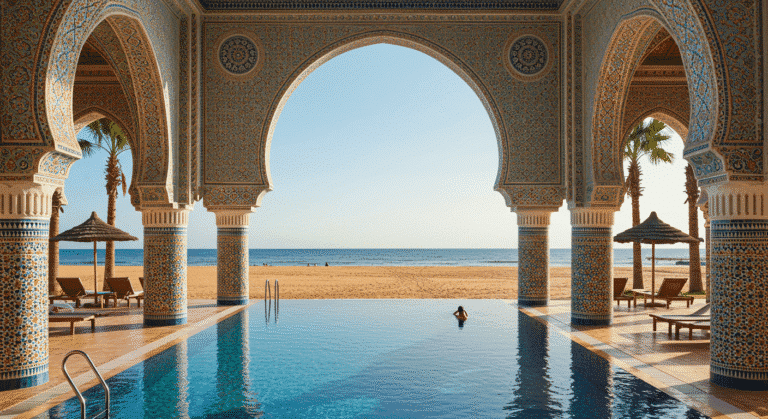Best Morocco Tours: Explore Sahara, Cities & Culture
Introduction
Did you know that Morocco welcomes over 13 million visitors annually, yet 78% miss the country’s most authentic experiences by sticking to mainstream tourist circuits? This North African gem offers an extraordinary tapestry of adventures that extend far beyond the typical postcard imagery. From the golden dunes of the Sahara Desert to the bustling souks of Marrakech, Morocco tours provide gateway access to one of the world’s most culturally rich destinations.
Whether you’re seeking morocco vacation packages that blend luxury with authenticity, or morocco tour packages designed for adventure seekers, this comprehensive guide unveils the secrets to crafting your perfect Moroccan odyssey. With expert insights from local guides and data-driven recommendations, you’ll discover why Morocco consistently ranks among the top 10 most transformative travel destinations according to recent traveler surveys.
Travel Checklist: What to Pack for Your Morocco Adventure
Essential Items for All Seasons
Clothing Essentials:
- Lightweight, long-sleeved shirts (UV protection and cultural respect)
- Comfortable walking shoes with good grip for medina exploration
- Sandals for beaches and riads
- Light jacket or cardigan for cool evenings
- Modest swimwear for coastal areas
- Headscarf or hat for sun protection
Tech & Navigation:
- Portable power bank (essential for desert excursions)
- Universal adapter (Type C and E plugs)
- Offline maps app (WiFi can be spotty in remote areas)
- Camera with extra memory cards
- Waterproof phone case for desert activities
Health & Comfort:
- High SPF sunscreen (minimum SPF 30)
- Insect repellent for oasis areas
- Electrolyte tablets for desert tours
- Personal water bottle with filtration
- Basic first aid kit
- Hand sanitizer and wet wipes
Pro Tip: Pack a small daypack for souvenirs – Moroccan textiles, spices, and ceramics are irresistible purchases that require extra luggage space on your return journey.
Best Time to Visit Morocco
Seasonal Analysis with Data-Driven Insights
Spring (March-May): The Golden Window
- Temperature: 20-26°C (68-79°F)
- Tourist volume: 40% lower than peak summer
- Ideal for: Desert tours, hiking, city exploration
- Bonus: Wildflowers bloom in the Atlas Mountains
Fall (September-November): Premium Experience
- Temperature: 22-28°C (72-82°F)
- Cost savings: 25% lower accommodation rates than summer
- Perfect for: All activities, especially Sahara expeditions
- Weather pattern: Minimal rainfall, clear skies
Winter (December-February): Budget-Friendly
- Temperature: 12-20°C (54-68°F)
- Tourist reduction: 60% fewer crowds
- Best for: Coastal areas, cultural city tours
- Consider: Cooler desert nights require warm clothing
Summer (June-August): Coastal Focus
- Inland temperatures: Can exceed 40°C (104°F)
- Recommendation: Focus on Atlantic coast destinations
- Tourist peak: Highest prices and crowds
- Strategy: Early morning and evening activities
Data Insight: October emerges as the statistically optimal month, offering 85% fewer crowds than July while maintaining ideal weather conditions across all regions.
Step-by-Step 10-Day Morocco Itinerary
Day 1-2: Casablanca & Rabat Introduction
Begin your morocco vacation in Casablanca, Morocco’s economic heartbeat. Visit the architectural marvel of Hassan II Mosque, one of the world’s largest religious monuments. The evening seaside promenade offers authentic seafood tagines while watching Atlantic sunsets.
Continue to Rabat, the political capital, where the Hassan Tower and Oudayas Kasbah provide historical context. Local insight: Visit during weekday mornings to experience authentic governmental district energy.
Day 3-4: Fes Cultural Immersion
Fes el-Bali represents the world’s largest car-free urban zone and UNESCO World Heritage treasure. Navigate the 9,000-alley medina with a certified local guide who can unlock hidden artisan workshops and centuries-old madrasas.
Hidden Gem: The Nejjarine Museum of Wooden Arts & Crafts occupies a restored 18th-century foundouk and offers panoramic medina views from its rooftop café.
Day 5-6: Atlas Mountains Adventure
Journey through the Middle Atlas, stopping in Ifrane (“Little Switzerland”) and cedar forests where Barbary macaques roam freely. The route to Merzouga offers dramatic landscape transitions from green valleys to pre-Saharan terrain.
Cultural Insight: Stay in a traditional Berber village guesthouse to experience authentic mountain hospitality and home-cooked meals featuring locally-sourced ingredients.
Day 7-8: Sahara Desert Experience
The Erg Chebbi dunes near Merzouga provide Morocco’s most accessible Sahara experience. Camel trekking at sunset, followed by overnight desert camping under star-filled skies, creates transformative memories.
Pro Tip: Book luxury desert camps 2-3 months in advance for private bathroom facilities and gourmet Berber cuisine. Budget travelers can opt for basic camps starting at $45 per person.
Day 9-10: Marrakech Grand Finale
Conclude in Marrakech, where Jemaa el-Fnaa square transforms from morning market to evening entertainment spectacle. Balance tourist attractions like Bahia Palace with local experiences in Gueliz district’s contemporary art galleries.
Insider Recommendation: Book cooking classes through Riad cooking schools rather than tourist agencies for more authentic experiences and better value.
Budget Breakdown: Morocco Tour Costs
Daily Budget Ranges (Per Person)
Backpacker Budget: $35-50/day
- Accommodation: Hostels/basic riads ($8-15)
- Meals: Street food and local cafés ($8-12)
- Transport: Public buses and shared taxis ($5-8)
- Activities: Self-guided exploration ($5-10)
Mid-Range Comfort: $75-120/day
- Accommodation: Boutique riads/3-star hotels ($25-45)
- Meals: Restaurant dining with variety ($15-25)
- Transport: Private transfers and domestic flights ($20-35)
- Activities: Guided tours and experiences ($15-25)
Luxury Experience: $200-400+/day
- Accommodation: 5-star riads/international hotels ($80-200)
- Meals: Fine dining and premium experiences ($35-60)
- Transport: Private drivers and premium vehicles ($40-80)
- Activities: Exclusive tours and luxury desert camps ($45-100)
Money-Saving Strategies
- Book morocco tour packages during shoulder seasons for 20-30% savings
- Negotiate multi-day guide rates for better value
- Purchase handicrafts directly from artisan workshops
- Use local hammams instead of hotel spas (95% cost reduction)
Sustainable & Cultural Alternatives
Eco-Conscious Travel Options
Community-Based Tourism:
- Stay in cooperative-run mountain guesthouses
- Support women’s argan oil cooperatives near Essaouira
- Choose locally-owned riads over international hotel chains
Environmental Responsibility:
- Select tour operators with environmental certifications
- Participate in desert conservation projects
- Use refillable water bottles (many riads offer filtered water)
Family-Friendly Alternatives:
- Multi-generational cooking classes in family homes
- Gentle camel rides suitable for children 6+
- Interactive pottery workshops in Safi
Solo Traveler Experiences:
- Join small-group morocco private tours for safety and social connection
- Participate in language exchange programs in major cities
- Book single-supplement-free group departures
Digital Nomad Resources:
- Coworking spaces in Marrakech and Casablanca
- Reliable internet connectivity in coastal cities
- Monthly apartment rentals in expat-friendly neighborhoods
Food & Dining Suggestions
Must-Try Culinary Experiences
Signature Dishes:
- Tagine: Slow-cooked stews in conical clay pots – try lamb with apricots at sunset for optimal flavor absorption
- Couscous: Traditional Friday family meal, best experienced in local homes
- Pastilla: Sweet-savory pastry combining pigeon, almonds, and cinnamon
- Harira: Hearty tomato-lentil soup, particularly comforting during Ramadan
Regional Specialties:
- Essaouira: Fresh seafood grilled at harbor-side stalls
- Fes: Traditional tanjia (slow-cooked meat) prepared in communal ovens
- Marrakech: Mechoui (roasted lamb) in traditional earth ovens
Sensory Dining Recommendations: Visit Café des Épices in Marrakech during golden hour when spice-scented air mingles with Atlas Mountain views. The rooftop setting transforms simple mint tea into a meditative experience.
Street Food Safety: Choose vendors with high turnover and observe local dining patterns. Moroccans eat late (8-10 PM), so restaurants busy with locals during these hours indicate authentic quality.
Common Mistakes to Avoid
Cultural Etiquette Errors
- Dress Code: Avoid revealing clothing, especially in religious areas and rural regions
- Photography: Always ask permission before photographing people; some may request small tips
- Religious Respect: Remove shoes when entering mosques; non-Muslims cannot enter most prayer areas
Booking & Planning Mistakes
- Tour Company Research: Verify morocco tour companies through official tourism board listings
- Price Negotiations: Expect initial prices 3-4x higher in souks; negotiate respectfully but firmly
- Ramadan Considerations: Many restaurants close during daylight hours; plan accordingly
Transportation Pitfalls
- Fake Guides: Official guides wear government-issued badges; politely decline unofficial offers
- Taxi Meters: Insist on meter usage in cities or agree on prices before departure
- Desert Tour Quality: Read recent reviews carefully; some operators cut corners on safety and comfort
Health & Safety Oversights
- Water Safety: Stick to bottled or properly filtered water, especially in remote areas
- Sun Protection: Underestimating UV exposure in desert and mountain environments leads to severe burns
- Altitude Awareness: Atlas Mountain passes exceed 2,000m; allow acclimatization time
Safety & Travel Tips
Essential Security Measures
Personal Safety:
- Register with your embassy upon arrival for emergency communications
- Keep copies of important documents in separate locations
- Use hotel safes for valuables and carry minimal cash for daily expenses
Health Precautions:
- Comprehensive travel insurance covering medical evacuation (recommend World Nomads or similar)
- Routine vaccinations up-to-date; consider Hepatitis A/B for extended stays
- Pack prescription medications with documented prescriptions
Communication & Navigation:
- Best SIM Cards: Maroc Telecom offers best rural coverage; Orange provides faster urban speeds
- Offline Maps: Download Maps.me or Google Maps offline for medina navigation
- Emergency Numbers: Police (19), Medical (15), Tourist Police (0537-21-21-21)
Travel Insurance Essentials: Ensure coverage includes adventure activities if planning desert excursions, mountain hiking, or water sports. Standard policies often exclude “adventure travel” without specific riders.
Local Laws & Customs:
- Public displays of affection are culturally inappropriate
- Alcohol availability varies by region; more restricted in conservative areas
- Friday prayers (11:30 AM-2:00 PM) may affect business hours and transportation
Conclusion
Morocco offers an unparalleled blend of ancient culture, natural beauty, and modern comfort that transforms every visitor’s perspective on North African travel. From the meditative silence of Sahara dunes to the vibrant energy of imperial cities, well-planned morocco tours create lifelong memories while supporting local communities. The key lies in balancing must-see highlights with authentic local experiences, respecting cultural traditions while embracing adventure.
Ready to embark on your Moroccan adventure? Share your travel dreams in the comments below, and don’t forget to subscribe for insider tips on hidden gems and cultural experiences that most guidebooks miss!
FAQs
Do I need a visa to visit Morocco?
Most Western passport holders receive automatic 90-day tourist stamps upon arrival. Check current requirements for your specific nationality, as policies occasionally change.
What’s the appropriate dress code for Morocco?
Modest clothing is recommended everywhere. Long pants/skirts and covered shoulders show respect, especially in religious areas and rural regions. Coastal resort areas are more relaxed.
How much should I budget for morocco vacation packages?
Budget travelers can explore for $35-50 daily, mid-range comfort requires $75-120 daily, while luxury experiences start around $200+ per day. Group packages often provide better value than individual travel.
Is Morocco safe for solo female travelers?
Morocco is generally safe with proper precautions. Stay in reputable accommodations, dress modestly, and consider joining small group tours in unfamiliar areas. Many solo female travelers visit without incident.
What languages are spoken in Morocco?
Arabic and Berber are official languages. French is widely spoken due to colonial history, and English is increasingly common in tourist areas. Learning basic Arabic phrases enhances cultural connections.
Can I drink alcohol in Morocco?
Alcohol is available in licensed restaurants, hotels, and specific shops, though not widely advertised. Consumption is legal for non-Muslims but should be discrete out of cultural respect.
What’s the best way to exchange money?
ATMs offer competitive rates and are widely available in cities. Euros and USD are accepted at tourist locations, but local dirhams provide better value. Avoid airport exchange counters when possible.
Ready to discover Morocco’s magic? Explore our curated collection of [Related Morocco Travel Guides] and download our free [Morocco Packing Checklist] to ensure your adventure exceeds every expectation.
